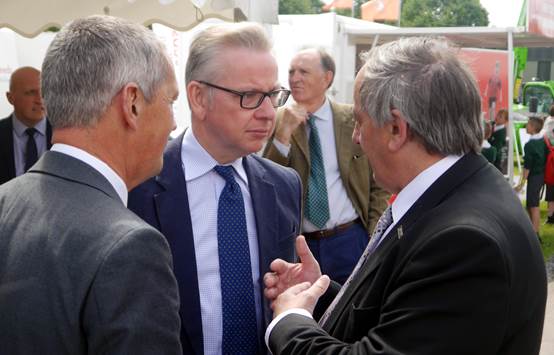
The NFU President Meurig Raymond has met with the new Environment Secretary Michael Gove at the Royal Three Counties Show to talk about the scope of policy priorities for the farming sector.
It is the first face-to-face meeting with the newly appointed Secretary of State and the National Farmers Union.
For Michael Gove, DEFRA faces some of the toughest challenges of any Government department as Brexit looms.
The EU Common Agricultural Policy (CAP), which many farmers rely on, will have to be replaced with a UK-focused system.
The NFU has also written an open letter to Gove, outlining wants and needs of the farming industry ahead of uncertain times.
In the face-to-face meeting at the Royal Three Counties, Mr Raymond took the opportunity to impress upon Mr Gove the importance of a sector worth £109bn to the economy, employing 3.8 million people and looking after 70% of the nation’s land.
'Critical issues'
Meurig Raymond said it was 'pleasing' to see Michael Gove talking and engaging with farmers at the agricultural show.
Mr Raymond said: “Throughout the meeting we discussed the critical issues which farming businesses face and also opportunities for the sector post-Brexit. I was pleased to be able to do this so soon after his appointment, and at the Royal Three Counties Show – a brilliant shop window for the industry.
“Farming is an industry which has the potential to further its strong contributions to the country – for the economy, the environment and the country’s ability to produce its own high quality, traceable food.”
The NFU President stressed the need for certainty as a 'constant theme' of DEFRA’s activity going forward into Brexit negotiations.
He continued: “When the UK exits the EU, farming businesses need to know what trading and regulatory environment, what labour we’ll have access to and what a domestic agricultural policy looks like.
“Outside of Brexit, there are still key issues for the industry – such as access to plant protection products, the implementation of the Government’s 25 year TB eradication strategy, the rehabilitating impact of rural crime – all of which need Defra’s attention.
“Following up on the letter I wrote to the Secretary of State when he was appointed, I reinforced the message that our shared aim is to ensure a productive, progressive and profitable future for British farmers and assurance to British public.”
